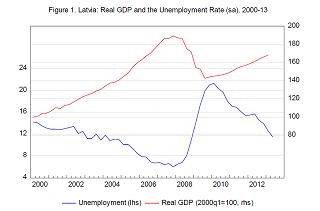Oppers, E., (2013), “Giving Credit Where Credit is Due: How to Design Policies that Work”, IMF direct, 02 Οκτωβρίου. What’s up with weak credit? Five years into the economic crisis credit is still barely growing, and even declining in many advanced economies. Weak credit growth is a major factor holding back the economic recovery and governments have tried every policy they can come up with to jumpstart credit. Still, banks …Read More
Europe’s Eroding Foreign Investment
Steinbock, D., (2013), “Europe’s Eroding Foreign Investment”, EconoMonitor, 02 Οκτωβρίου. Today foreign direct investment (FDI) is driven by emerging nations and the impending unwinding of U.S. monetary stimulus. In Europe, the lingering debt crisis is reflected in the dramatic plunge of FDI inflows. In the postwar era, the degree of global economic integration was still relatively low. As a result, international trade played a vital role in global growth. Today, …Read More
The euro complements Northern European economies more effectively than those in Southern Europe
Marzinotto, B., (2013), “The euro complements Northern European economies more effectively than those in Southern Europe”, Europeans Politics and Policy Blog, 02 Οκτωβρίου. Why has the Eurozone crisis affected Southern European countries more severely than Northern European countries? Benedicta Marzinotto writes that it is necessary for monetary and fiscal policies to complement structural factors within an economy, such as labour market institutions. She argues that the transition to the euro …Read More
Independent monetary policies, synchronised outcomes
Henriksen, E., Kydland, F. and Šustek, R., (2013), “Independent monetary policies, synchronised outcomes”, VoxEU, 02 Οκτωβρίου. The monetary policy for Eurozone members is one-size-fits-all in an economic area rife with economic differences. Does this really make a difference? This column argues that even if each EZ member state had a fully independent monetary authority, monetary policies would likely still appear highly synchronised across EZ members. Σχετικές Αναρτήσεις Fernandes, S. …Read More
Tax-policy procyclicality
Vegh, C. and Vuletin, G., (2013), “Tax-policy procyclicality”, VoxEU, 01 Οκτωβρίου. Government spending is procyclical in developing countries, exacerbating the business cycle. However, an analysis of tax policy is also required in order to properly assess the overall stance of fiscal policy. This column presents recent research showing that tax policy tends to be procyclical in developing countries and acyclical in developed countries. Although some developing countries have managed to …Read More
The Eurozone’s Calm before the Storm
Roubini, N., (2013), “The Eurozone’s Calm before the Storm”, Project Syndicate, 30 Σεπτεμβρίου. A little more than a year ago, in the summer of 2012, the eurozone, faced with growing fears of a Greek exit and unsustainably high borrowing costs for Italy and Spain, appeared to be on the brink of collapse. Today, the risk that the monetary union could disintegrate has diminished significantly – but the factors that fueled …Read More
Tax incidence in the presence of tax evasion
Kopczuk, W., Marion, J., Muehlegger, E. and Slemrod, J., (2013), “Tax incidence in the presence of tax evasion”, VoxEU, 30 Σεπτεμβρίου. Tax evasion and noncompliance reduces government revenue and exacerbates the problem of increasing debt. Standard economic theory predicts that the identity of the tax remitter shouldn’t affect outcomes – but this ignores the possibility of evasion. This column provides evidence that in the presence of evasion, both the amount …Read More
Η μεθυσμένη Ευρώπη
Καλλίτσης, Κ., (2013), “Η μεθυσμένη Ευρώπη”, Η Καθημερινή, 29 Σεπτεμβρίου. Το σχέδιο για το ευρώ ήταν παράγωγο ενός Μεγάλου Σχεδίου για μια Ενωμένη Ευρώπη ειρήνης, ευημερίας και αλληλεγγύης. Το Μεγάλο Σχέδιο είχε τρεις στόχους: (α) Να αποτραπεί ένας νέος ευρωπαϊκός διχασμός -μετά την εμπειρία της φρίκης δύο μεγάλων πολέμων που άφησαν συντρίμμια και περίπου 50 εκατομμύρια νεκρούς. (β) Να ενισχυθεί η δημοκρατία -μετά την εμπειρία, στον μεσοπόλεμο, της Κρίσης που …Read More
Germany as Currency Manipulator
Krugman, P., (2013), “Germany as Currency Manipulator”, The New York Times, The Conscience of a Liberal Blog, 27 Σεπτεμβρίου. […] The general point is that if we imagine a euro breakup, I think everyone would agree that the new mark would soar in value, making German manufacturing much less competitive. The German public imagines that it is being cruelly exploited for the benefit of lazy southerners; arguably, what’s really happening …Read More
As good as it gets in Latvia?
Hugh, E., (2013), “As good as it gets in Latvia?”, Fistfulofeuros Blog, 29 Σεπτεμβρίου. “This raises a final question, which, while not central to the issues of this paper, is nevertheless intriguing: How can a country with a low minimum wage, weak unions, limited unemployment insurance and employment protection, have such a high natural rate [of unemployment]?” “To summarize, the actual unemployment rate is still probably higher than, but close …Read More





